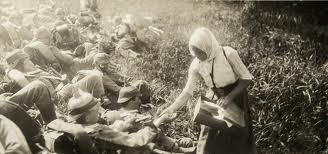Letters from the Frozen, Blood-Soaked Battlefield.
Every Man Wants it Ended “At Once.”
Special to The Great War Project.
(4-5 December) In these days of freezing temperatures and mounting fatalities, an extraordinary exchange of letters takes place involving Winston Churchill, the British First Lord of the Admiralty and one of Britain’s most aggressively pro-war senior officials.
At this time a century ago Churchill learns that a close friend is killed in action.
He also receives a letter from another close friend, Valentine Fleming, like Churchill a Member of Parliament but now fighting on the Western Front.
Historian Martin Gilbert quotes extensively from these letters. Fleming refers to the “indescribable ravages of modern artillery fire,” and to the battlefields that are “positively littered with the bodies of men and scarified with their rude graves, disfigured by cattle, horses, sheep and goats, scattered in every attitude of repulsive disorder and dismemberment.”
Fleming calls it a “terrain of death.” He ends his letter this way:
“It’s going to be a long war in spite of the fact that…
on both sides every single man in it wants it stopped at once.”
Around this time Churchill too writes a letter, to his wife Clementine. “What would happen I wonder if the armies suddenly and simultaneously went on strike and said some other method must be found of settling the dispute!”
Meanwhile Churchill observes, “new avalanches of men” are preparing to be thrown into the conflict “and it widens every minute.”
The crisis facing the Central Powers is Austria-Hungary. On the Eastern Front, in its battle with the Russians, it is falling apart, desperately hoping for rescue from Germany.
In the first week of December a century ago, the Austrians and the Russians find themselves locked in a battle to seize the Polish city of Cracow. “The Austrians had their backs to the wall,” writes historian Geoffrey Wawro….
“The two sodden, shivering armies fought savagely for two weeks.”
But the Austrians continue to make deadly mistakes. In some cases, the Austrian artillery shells their own men, reports Wawro.
The Russians hardly perform much better, losing more than a thousand soldiers taken prisoner of war in a single day.
A German soldier, observing Russian POWs begging for a morsel of bread, describes their plight. “They climbed on top of each other, up the iron bars, screamed with bulging eyes, stretched-out hands, in greedy, hoarse voices, each one seeking to draw attention to his own hunger.”
In this fighting in early December, 23,000 Russians become POWs.
But all this savage fighting results only in tortured, frozen stalemate. And freezing soldiers. “The men too were freezing in place,” writes one German officer, “provided with nothing but sheets of paper to wrap their frostbitten feet.”
One other letter of note from this moment a century ago. “It is a sheer miracle,” writes a soldier in the German army, “that I am hale and hearty, what with the tremendous exertions and the lack of sleep.”
The soldier has just received the Iron Cross. His name: Adolph Hitler.



Very interesting project.